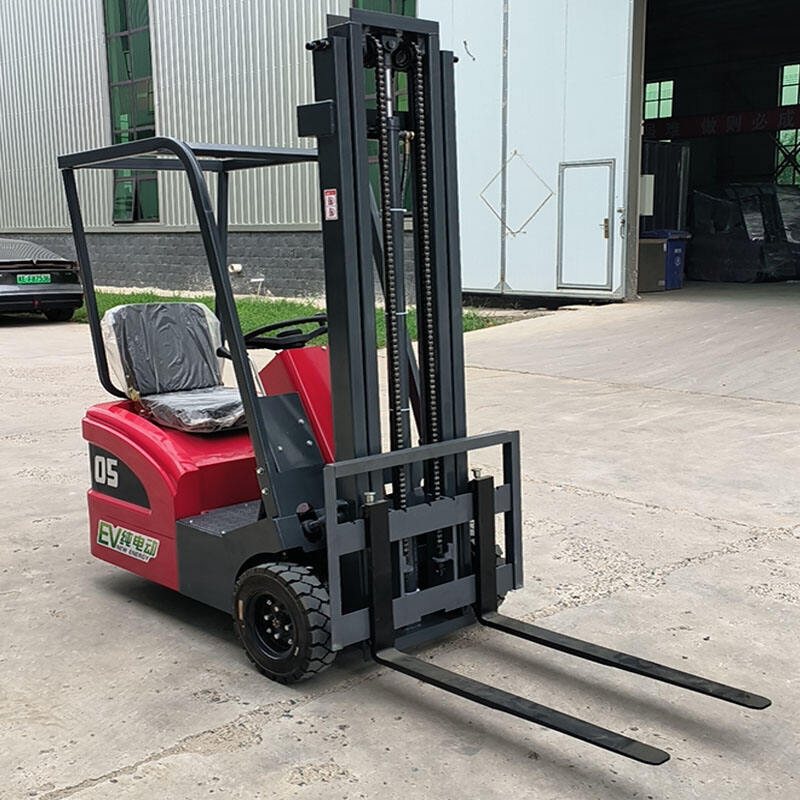Electric Forklift Solutions for Zero-Emission Warehousing
Why Electric Forklift Solutions Are Essential for Zero-Emission Warehousing
Environmental Impact of Traditional Forklifts
Most traditional forklifts run on diesel or gasoline, which means they pump out a lot of greenhouse gases while operating. According to EPA data, vehicles with internal combustion engines account for around 29 percent of all transportation emissions in the US alone. That's quite a carbon footprint when we're talking about warehouse operations running 24/7. Electric forklifts offer something different here. They cut emissions completely at the source, making them a real game changer for companies trying to meet climate goals set by agreements like Paris. Beyond just cutting CO2, these electric models also stop releasing dangerous stuff like particulate matter and nitrogen oxides. Warehouses switching to electric often report better indoor air quality, and workers notice the difference too. Cleaner air means fewer respiratory issues among staff who spend long hours inside those facilities.
Operational and Cost Benefits of Electric Solutions
Switching to electric forklifts brings real benefits both operationally and financially compared to older models running on gas or diesel. A recent report from the Forklift Truck Association found companies could save around 15% on running costs after making the switch, mainly because there's no need to spend money on fuel and they require far less maintenance work. The reason? Electric models just don't have as many moving parts inside them, so breakdowns happen less often and these machines tend to last longer overall. What's more, modern electric forklifts keep working efficiently throughout their shifts thanks to fast charging systems that let workers get back to tasks quickly without long downtime periods. No wonder warehouses across the country are gradually replacing their old equipment with electric alternatives when looking to improve workflow and reduce expenses at the same time.
Key Features of High-Performance Electric Forklift Trucks
Maneuverability and Space Efficiency
Electric forklifts with high performance handle tight corners and narrow passages much better than their gas counterparts. These machines fit through small gaps between shelves and move around packed warehouse floors where bigger vehicles would struggle. The smaller footprint means companies can actually store more goods on site while still keeping everything within reach. Most modern models come equipped with smart steering tech that gives operators precise control, especially when working among moving parts or people. This kind of control translates to faster job completion times and fewer incidents on the floor, which warehouse managers definitely appreciate during peak seasons.
Advanced Battery Technology and Energy Efficiency
Electric forklifts these days rely on better battery tech, mostly lithium ion stuff now, which means longer runtime between charges and much quicker recharge times compared to old school lead acid batteries. The switch has made a real difference in how efficiently these machines use power. Less time sitting idle waiting to charge, plus they keep performing well throughout their work shifts without dropping off. Some newer models even come with regen braking systems that grab back some of the energy normally wasted during stops. This not only makes them more efficient but also helps cut down on overall energy costs for warehouse operations looking to go green.
Safety Systems and Operator Ergonomics
When it comes to high performance electric forklifts, safety takes center stage. These machines come packed with modern braking tech and stability control systems that make them much safer than older models. The stats back this up too many warehouses report fewer incidents since upgrading their fleet. Operators also benefit from controls that fit better in their hands and seats that can be adjusted to different body types, making those long 8 hour shifts just a little less exhausting. Most manufacturers include flashing lights and warning sounds now as standard features. These alerts keep workers on their toes and help companies stay compliant with OSHA requirements. At the end of the day, all these improvements create workplaces where people actually feel safe doing their jobs without constantly worrying about equipment failures.
Top Electric Forklift Solutions for Sustainable Operations
0.5T Three Wheels Forklift: Agile Narrow-Aisle Solution
The 0.5T three wheel forklift was built with agility in mind, which makes it great for working in those really narrow aisles and cramped storage areas that most standard forklifts can't handle. Because of its small footprint, workers can move around without getting stuck, and this actually creates more room in the warehouse for storing inventory or placing other machinery. What sets this model apart is how well it turns despite having only three wheels. The design keeps things stable even when making sharp corners, so it's becoming increasingly popular among businesses operating out of smaller facilities where being able to turn on a dime matters more than anything else.
CPD20 2Ton Customized Electric Forklift Trucks: Heavy-Duty Precision
The CPD20 electric forklift is built for serious workloads, capable of lifting around 2 tons with pretty good accuracy. That makes it a must-have piece of equipment for warehouses and manufacturing facilities where logistics just won't cut any corners. What really sets this model apart though are its customization options. Companies can adjust various specs based on what they actually need day to day, which means better performance across different tasks. Safety remains top priority too thanks to advanced systems that monitor load weights in real time while maintaining balance throughout each operation. These features help prevent accidents and downtime, something plant managers definitely appreciate when running tight schedules.
0.5ton Three Wheel Forklift
The 0.5 ton three wheel forklift delivers solid performance that stands out for lasting power and built-in safety measures. What makes this model special is its three wheel design that lets operators navigate tight spaces with ease something that matters a lot in warehouses packed with inventory and moving parts. The machine comes equipped with emergency brakes that kick in when needed most plus an automatic shut off system that kicks in if things get too hot or unstable. These aren't just fancy additions they actually make a difference when workers need to rely on their equipment day after day without worrying about breakdowns or accidents.
Implementing Electric Forklifts in Warehouse Operations
Transitioning from Propane to Electric Systems
Switching over from propane powered forklifts to electric ones isn't something companies should rush into without proper preparation. First things first, they need to take a good look at how their warehouse is laid out and figure out what exactly their daily operations require. Getting this right means the electric models will actually work well in the available space and handle whatever workload comes their way. Training staff on these new machines matters just as much though. Electric forklifts operate differently than their propane counterparts, so there's definitely a learning period involved here. The good news? Making this change can cut down on expenses pretty substantially. When businesses run the numbers, they typically find that fuel costs drop off a cliff while maintenance bills shrink too. Electric forklifts just don't need as much upkeep as those old propane models. All told, going electric makes financial sense for most operations in the long run.
Maintenance Best Practices for Electric Fork Truck Fleets
Regular maintenance schedules really matter when it comes to keeping electric forklifts running smoothly and making them last longer. A good routine should include checking diagnostics and calibrations so everything works properly. These kinds of preventive actions stop unexpected breakdowns and keep performance at its best. Checking things periodically also helps maintain proper charge levels and stops batteries from wearing out too fast. Another important aspect is training technicians specifically for electric forklift maintenance. When staff knows exactly what they're doing with these specialized machines, the whole fleet runs better. Technicians who understand electric models inside out tend to spot problems early and fix them right away, which means less downtime and more consistent operations across the board.
Incorporating these strategies not only fosters a more sustainable and efficient operation but also aligns with the growing trend towards cleaner, more environmentally-friendly warehousing solutions.



